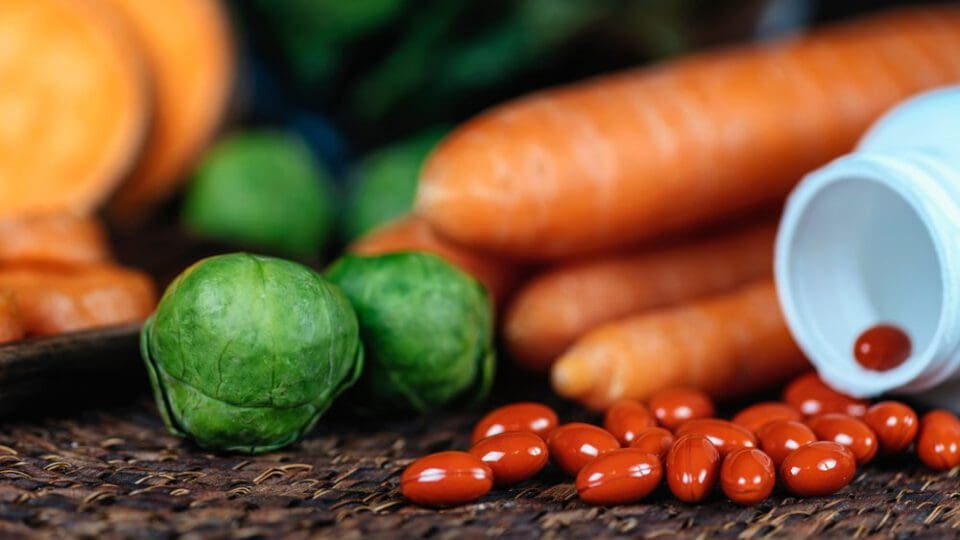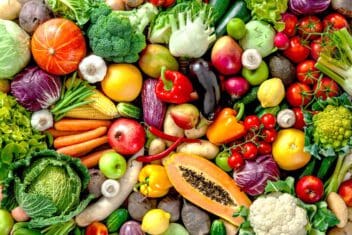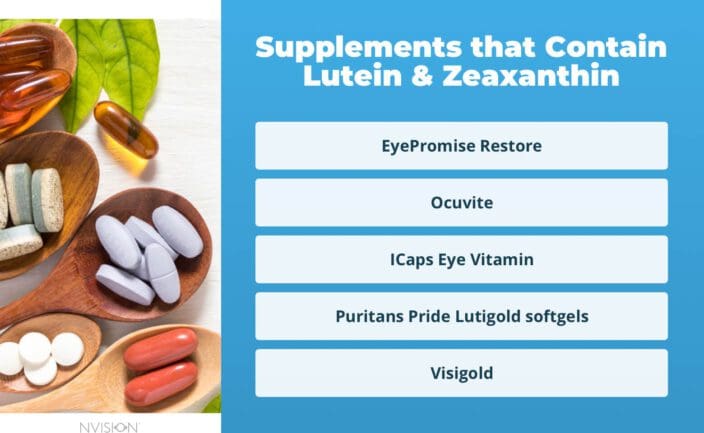Do Lutein and Zeaxanthin Really Improve Vision?
Home / How Diet Impacts Eye Health & Vision /
Last Updated:
These two nutrients are often discussed in relation to eye health. While they do protect the whole body, they are especially important when it comes to your eyes. They offer protective benefits against certain eye diseases and promote overall healthier vision.
There are multiple nutrients that your eyes need for optimal health. Lutein and zeaxanthin are carotenoids that your eyes require to function normally.
Table of Contents
Getting these nutrients from your diet is preferable to taking supplements.
If you choose the supplement route, it is imperative that you get the right dose for safety and efficacy. Adults should get 10 mg of lutein and 2 mg of zeaxanthin per day.
Without adequate levels of these antioxidants, eye damage can occur over time.
What Are Lutein and Zeaxanthin?

Both of these nutrients are chemically similar, with only a minor difference in the atom arrangement.
Since these carotenoids function as antioxidants, they are important to fighting free radicals, a type of unstable molecule. When free radicals are going to work in your body, it can contribute to a variety of negative effects, such as heart disease progression, cancer growth, or aging. By defending against free radicals, they help multiple body systems, including your eyes.
You deserve clear vision. We can help.
With 135+ locations and over 2.5 million procedures performed, our board-certified eye surgeons deliver results you can trust. Your journey to better vision starts here.
Both of these antioxidants help another important antioxidant known as glutathione. They work to recycle it, so you have enough to keep your body healthy. These nutrients also help to protect the body’s fats, DNA, and proteins from stressors.
Both of these carotenoids can work alone to protect against free radical damage. However, they appear to be more effective when you take them both at the same time.
How They Relate to Eye Health
These two nutrients are often discussed in relation to eye health. While they do protect the whole body, they are especially important when it comes to your eyes. They offer protective benefits against certain eye diseases and promote overall healthier vision.
In your eyes, the yellowish color of the macula is due to these nutrients. In this eye structure, both carotenoids are present in high concentrations.

Getting These Nutrients

One of the best ways of incorporating lutein and zeaxanthin into your diet is to consume fruits, nuts and leafy vegetables. Green, leafy vegetables contain high amounts of both, but you can also find the healthy nutrients in colorful vegetables and fruits, such as peas, tangerines and persimmons.
Corn and egg yolk have the highest concentration of lutein and zeaxanthin (more than 85% of the total carotenoids). Corn contains the highest lutein concentration at 60%, while orange pepper stores 37% of total zeaxanthin.
Grapes, orange juice, spinach, vegetable marrow and kiwi fruits have between 30 to 50% of lutein and zeaxanthin.
The researchers found that consuming one egg daily for five weeks increased lutein and zeaxanthin levels by 26% and 38%, respectively. In addition, 20 adults taking three eggs daily for 12 weeks improved their lutein levels by 21% and zeaxanthin by 48%.
The same research also notes that while most dietary models suggest consuming 10 mg per day of lutein/zeaxanthin, this is the utmost limit of what you can achieve through daily diet intake. It points out that 2.5 mg of both lutein and zeaxanthin may be enough to protect you against age-related macular degeneration (AMD).
Many studies show that you can reduce the risk of chronic eye disease, such as developing new cataracts, by intaking the nutrients.
The following foods are high in Lutein:
- Cooked Spinach
- Cooked Kale
- Raw romaine lettuce
- Raw pistachio nuts
- Cooked broccoli
- Cooked asparagus
- Cooked green beans
The following foods contain both Lutein and Zeaxanthin:
- Cooked corn
- Raw orange pepper
- Raw egg yolk

You deserve clear vision. We can help.
With 135+ locations and over 2.5 million procedures performed, our board-certified eye surgeons deliver results you can trust. Your journey to better vision starts here.
Supplements that Provide Lutein and Zeaxanthin
If you feel you’re not getting enough zeaxanthin or lutein, a great way to top up on the nutrient is through supplements. One good thing about going down this path is there is no known side effect of taking too much lutein and zeaxanthin.
Most supplements derive their lutein deposits from marigold flowers, while zeaxanthin supplements get theirs from red peppers. These are the most common supplements that provide zeaxanthin and lutein:
- EyePromise Restore: The soft gels are enriched with fish oil, zinc, and vitamins B, C, D, and E
- Ocuvite: Apart from zeaxanthin and lutein, it contains zinc, Omega 3, copper and Vitamins C and E
- ICaps Eye Vitamin: Comprises zinc, copper, and Vitamins A, C and E
- Puritans Pride Lutigold soft gels: Rich in safflower oil, yellow beeswax and vegetable glycerin
- Visigold: Main ingredients are from marigold, complemented by sunflower oil and glycerin
Understand that supplements do not undergo rigorous testing or verification by the FDA, so there’s no telling the exact amounts of lutein or zeaxanthin contained in the bottles. This makes it difficult to know how effective supplements are compared to food sources.
Consuming too much zeaxanthin, lutein or other foods rich in carotenoids, such as carrots and green or yellow citrus fruits, will lead to skin yellowing. This is the same side effect as the yellowing of skin for those who have jaundice, but in this case the change is harmless, and it will clear up with reduced consumption.
Nutritionists stress that supplements shouldn’t replace a normal diet. Use supplements to complement a healthy, balanced diet containing corn, fruits, and leafy vegetables.
How These Nutrients Impact Eye Health
Lutein and zeaxanthin form the main constituents of macular pigment (MP), a yellow coloring matter in the retina situated at the back of your eye. If you don’t have sufficient lutein/zeaxanthin levels, it could eventually impair your eye’s health.
Without adequate levels of both nutrients, free radicals may eventually overpower the available antioxidants and damage your eyes. The nutrients are at the frontline of protecting your eyes against AMD and other eye-related diseases like cancer.
Both nutrients also work like sunscreen for your eyes. MP is an optical filter for blue light, protecting the retina by providing an antioxidant shield that stops the reaction between reactive oxygen and unsaturated fatty acids, a harmful process known as peroxidation.
If you have any of these eye issues, you may benefit from appropriate lutein and zeaxanthin levels:
- Age-related macular degeneration: May help minimize the risk of AMD triggering blindness.
- Cataracts: Their formation may decline.
- Uveitis: Lutein/zeaxanthin may lessen the inflammatory process.
- Diabetic retinopathy: The oxidative stress markers that may cause eye damage appear to reduce due to these nutrients.
- Retinal detachment: Lutein/zeaxanthin may help lessen the death of the cell in your retina that’s responsible for converting light signals into a form of information that your brain can turn into visions (photoreceptor).
Not all studies document preventive benefits of these nutrients. For instance, researchers have not found definitive proof that lutein will protect you against AMD, diabetic retinopathy, and cataract development.
At best, fruits and vegetables are good sources of antioxidants, such as carotenoids, that work well at preventing many diseases. While lutein and zeaxanthin have their specific benefits, there are also other natural approaches to eye health you might consider, like castor oil for eyes.
You deserve clear vision. We can help.
With 135+ locations and over 2.5 million procedures performed, our board-certified eye surgeons deliver results you can trust. Your journey to better vision starts here.
References
- Carotenoids: Potential Allies of Cardiovascular Health? (February 2015). Food and Nutrition Research.
- Studies on the Singlet Oxygen Scavenging Mechanism of Human Macular Pigment. (December 2011). Archives of Biochemistry and Biophysics.
- Lutein and Zeaxanthin. American Optometric Association.
- Fruits and Vegetables That Are Sources for Lutein and Zeaxanthin: The Macular Pigment in Human Eyes. British Journal of Ophthalmology.
- Lutein and Zeaxanthin – Food Sources, Bioavailability, and Dietary Variety in Age-Related Macular Degeneration Protection. (February 2017). Nutrients.
- The Photobiology of Lutein and Zeaxanthin in the Eye. (December 2015). Journal of Ophthalmology.
- Diet and Nutrition. (2021). American Optometric Association.
- Fruits and Vegetables That Are Sources for Lutein and Zeaxanthin: The Macular Pigment in Human Eyes. (August 1998). British Journal of Ophthalmology.
- Lutein and Zeaxanthin—Food Sources, Bioavailability and Dietary Variety in Age-Related Macular Degeneration Protection. (February 2017). U.S. National Library of Medicine.
- Lutein as a functional food ingredient: Stability and bioavailability. (March 2020). ScienceDirect.
- The Effect of Lutein on Eye and Extra-Eye Health. (September 2018). U.S. National Library of Medicine.
- The Photobiology of Lutein and Zeaxanthin in the Eye. (December 2015). U.S. National Library of Medicine.
- Ocular Nutritional Supplements. (March 2015). American Academy of Ophthalmology.
- The effects of a lutein-based supplement on objective and subjective measures of retinal and visual function in eyes with age-related maculopathy – a randomised controlled trial. (October 2012). Cambridge University Press.
This content is for informational purposes only. It may have been reviewed by a licensed physician, but is not intended to serve as a substitute for professional medical advice. Always consult your healthcare provider with any health concerns. For more, read our Privacy Policy and Editorial Policy.